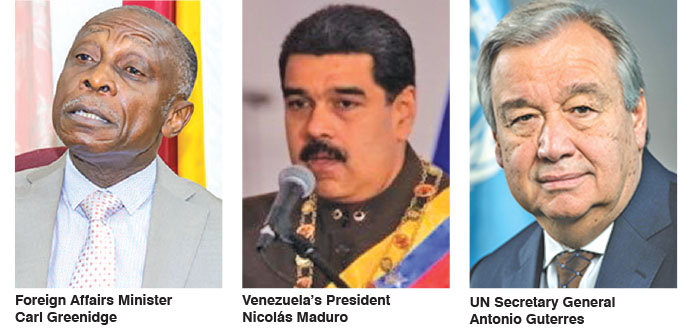Guyana-Venezuela controversy
…if Venezuela decides to take military action
Guyana is prepared to call on the United Nations (UN) Security Council if Venezuela ever decides to take any military action against this country, especially if the International Court of Justice (ICJ) upholds the 1899 Agreement and rules in the country’s favour to keep the boundaries in place. 
Foreign Affairs Minister Carl Greenidge told Guyana Times in a recent interview that if Venezuela ever makes such a move to invade Guyana, then it would mean that the country would be breaking the zone of peace based on the same agreement that was brokered and sanctioned by the United States.
Greenidge noted that if the matter is sent to the ICJ, the highest international judicial body in the world, and it is pronounced that the treaty is valid (which is the case), then Venezuela has no basis for being upset; and if at all there is basis to be upset, that basis does not extend to the point where Venezuela should even consider taking action against Guyana.
“If they take any military action, we are in a position to call on the UN Security Council to use the powers and liberties at their disposal to constrain them,” he explained, adding that all eyes will be on the Spanish-speaking country’s response to the final decision on the decades-long matter.
Vice-President Greenidge also brushed aside comments suggesting that Venezuela would use similar tactics as obtained decades ago when countries like Haiti were invaded. He said it is highly unlikely that such moves would be tolerated, or even allowed to happen in the twenty-first century.
According to Chapter Seven of the UN Charter, which deals with action in respect to threats to the peace, breaches of the peace, and acts of aggression, Article 42 says it could take action by air, sea, or land forces as may be necessary to maintain or restore peace and security. Such action may include demonstrations, blockades, and other operations by air, sea, or land forces of members of the UN.
Challenge
In the meantime, however, the Government is making all the necessary preparations to challenge Venezuela at the ICJ over the border controversy, as it feels this will be the decision to be handed down by the UN following the expiration of the Good Offices process, which ended in 2017.
Minister Greenidge has said that while that decision is solely dependent on Secretary General António Guterres, who will determine if there was significant progress made in the advance mediation process; based on Venezuela’s obdurate posture, a court challenge might be possible.
Greenidge said Guyana has been preparing for this for a long time, especially after the matter was discussed at the UN.
“Guyana has been preparing to go to court, because we understand that Secretary General Ban Ki-moon did say that the problem caused by Venezuela’s contention is a judicial one.”
Moreover, the Vice President has said that if Venezuela were prepared to argue that a legal agreement is null and void, then, in normal circumstances, it is only a legal body that can judge whether there is nullity. And that decision, according to him, could only be done based on clear and well established criteria.
“And that is what we were calling on the UN to do; that is: to refer the matter to an appropriate body, which is the ICJ. Because they agree, and we agree, that it is a judicial contention and it needs to be resolved by a court, or it will not be resolved at all,” he added.
Greenidge noted that Guyana was still reasonable in facilitating the Good Offices process, although knowing fully well that 51 years have been spent on trying to resolve this controversy. Now that the process has ended on December 31, 2017, the Minister thinks that nothing significant had happened within that year, especially since Guyana’s Spanish-speaking neighbor had declined to join the process.
“That process started in 2017 and concluded by December 31, 2017. And what was supposed to happen? I would like to say at this point, while not pronouncing on the process: it doesn’t follow that every problem on Earth can be solved by mediation, advanced or otherwise,” he opined.
Support
Greenidge also noted that the Guyana Government has managed to place the border controversy at the top of the international agenda, lobbying the UN Secretary General and gaining support from the Caribbean Community (Caricom), the Commonwealth nations, and nation states.
While crediting the previous administration for attempting to deepen relations with Venezuela, the Minister said this did not exactly work out in the country’s best interest. In 2013, Venezuela’s Navy seized a survey boat which was being used by Texas-based Anadarko. Venezuela said the ship had violated its waters.
During that time, Guyana argued that the boat was well within its territory.
“What we have sought to do since then is to work more closely with countries in Latin America from which Venezuela had, because of colonial experience, been able to mobilize sympathy, if not support,” he explained, adding that this matter has also drawn enormous regional support.
The Minister said, “What we understand is that there is a strengthening in the region of a belief in keeping this as a peaceful zone first of all. No force (must be used) to resolve a controversy, and the countries believe in the sanctity of treaties and the rule of law; hence the response we have received.”
